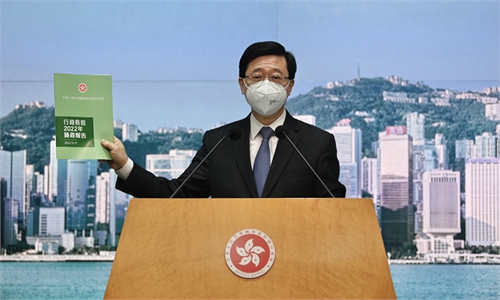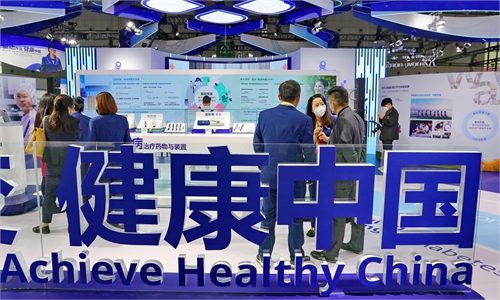HKSAR maintains strong presence at CIIE, as it eyes more opportunities in the mainland

The skyline of Hong Kong Photo: VCG
The principle of One Country, Two Systems is the biggest advantage for the development of the Hong Kong Special Administrative Region (HKSAR), Kent Lyu, regional director of the Hong Kong Trade Development Council (HKTDC) for Eastern and Central China, told the Global Times at the ongoing China International Import Expo (CIIE) in Shanghai.Lyu stressed that the Chinese mainland is the biggest opportunity for Hong Kong enterprises, adding that the HKSAR is a channel for circulating capital, services and products to link the mainland economy with the global economy.
This CIIE is the fifth consecutive year for the HKTDC to set up the Hong Kong Services Zone and the Hong Kong Product Zone at the venue. The service zone this year has the theme "Channeling Global Business Through Hong Kong," which highlights the opportunities and roles of the city under the 14th Five-Year Plan (2021-25)
It also aims to demonstrate Hong Kong's distinctive advantages of enjoying the strong support of the motherland, while being closely connected to the world, the HKSAR government said in a statement on November 4.
Products and services from the HKSAR using innovative technologies are a new highlight for this year's CIIE, according to Lyu.
For instance, products such as drinks created from salads and plant-based meat made their way to Shanghai, aiming to pave the way for introducing more advanced technologies to the Chinese mainland market.
In terms of services trade, enterprises targeting digital businesses such as virtual assets are seeking to cooperate with marketing agencies and counterparts from the Chinese mainland.
The CIIE provides enormous opportunities for Hong Kong enterprises to tap into the mainland market, as the HKSAR has been actively participating in the CIIE since the session held in 2018, read the statement from the HKSAR government.
The statement noted that over 200 Hong Kong enterprises are attending this year's CIIE to grasp the opportunities to promote Hong Kong's high-quality products and services to exhibitors and buyers from around the world.
Lyu said that some Hong Kong enterprises that participated in past fairs got orders from customers they met through the event. Hong Kong-based small and medium-sized enterprises (SMEs) can make use of the expo as a platform to promote their products and services with the help of the HKTDC, while companies can get better access and have more understanding of the mainland market.
Hong Kong has a strong research and development capability and resources, but it's hard to turn this work into actual projects due to a small market and lack of application scenarios, Lyu said.
Lyu said that the HKSAR hopes to connect the mainland technology sector with international resources and markets, especially as the 14th Five-Year Plan stepped up support for Hong Kong to develop into an international innovation and technology hub.
HKSAR Chief Executive John Lee Ka-chiu stressed in his policy address in October that innovation and technology (I&T) provides a key impetus for Hong Kong's high-quality economic development, and the HKSAR government will promulgate the Hong Kong I&T Development Blueprint within 2022 to set out major policies under four broad development directions.


